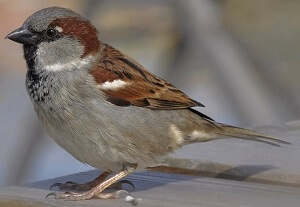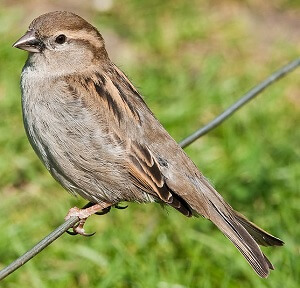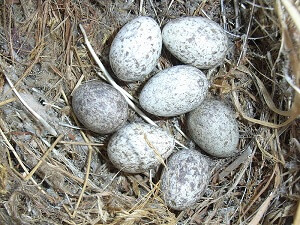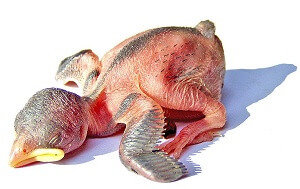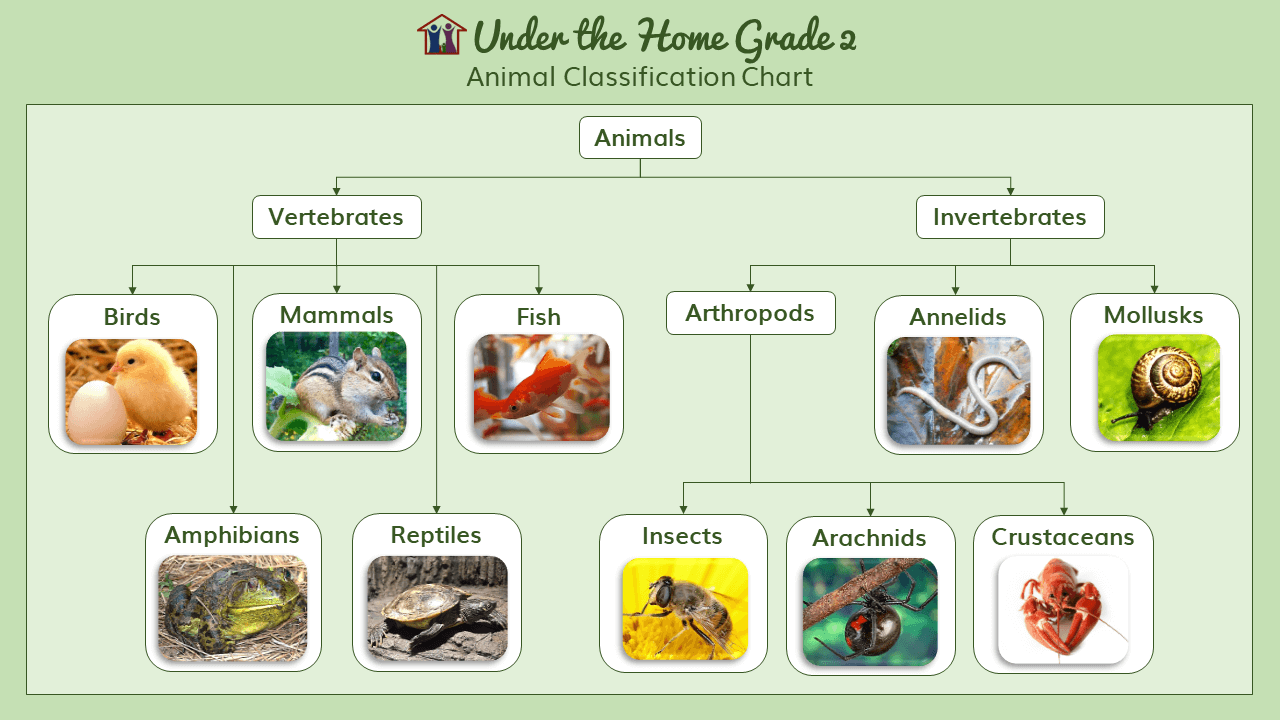Lesson 19: The Sparrow
Performer: LibriVox - Dorothy Lieder
'The Old Orchard Bully - The English or House Sparrow' from The Burgess Bird Book for Children by Thornton W. Burgess
Peter Rabbit's eyes twinkled when Jenny Wren said that she must look her old house over to see if it was fit to live in. "I can save you that trouble," said he.
"What do you mean?" Jenny's voice was very sharp.
"Only that our old house is already occupied," replied Peter. "Bully the English Sparrow has been living in it for the last two months. In fact, he already has a good-sized family there."
"What?" screamed Jenny and Mr. Wren together. Then without even saying goodbye to Peter, they flew in a great rage to see if he had told them the truth. Presently he heard them scolding as fast as their tongues could go, and this is very fast indeed.
"Much good that will do them," chuckled Peter. "They will have to find a new house this year. All the sharp tongues in the world couldn't budge Bully the English sparrow. My, my, my, my, just listen to that racket! I think I'll go over and see what is going on."
So Peter hopped to a place where he could get a good view of Jenny Wren's old home and still not be too far from the safety of the old stone wall. Jenny Wren's old home had been in a hole in one of the old apple trees. Looking over to it, Peter could see Mrs. Bully sitting in the little round doorway and quite filling it. She was shrieking excitedly. Hopping and flitting from twig to twig close by were Jenny and Mr. Wren, their tails pointing almost straight up to the sky, and scolding as fast as they could make their tongues go. Flying savagely at one and then at the other, and almost drowning their voices with his own harsh cries, was Bully himself. He was perhaps one fourth larger than Mr. Wren, although he looked half again as big. But for the fact that his new spring suit was very dirty, due to his fondness for taking dust baths and the fact that he cares nothing about his personal appearance and takes no care of himself, he would have been a fairly good-looking fellow. His back was more or less of an ashy color with black and chestnut stripes. His wings were brown with a white bar on each. His throat and breast were black, and below that he was of a dirty white. The sides of his throat were white and the back of his neck chestnut.
By ruffling up his feathers and raising his wings slightly as he hopped about, he had managed to make himself appear much bigger than he really was. He looked like a regular little fighting savage. The noise had brought all the other birds in the Old Orchard to see what was going on, and every one of them was screaming and urging Jenny and Mr. Wren to stand up for their rights. Not one of them had a good word for Bully and his wife. It certainly was a disgraceful neighborhood squabble.
Bully the English Sparrow is a born fighter. He never is happier than when he is in the midst of a fight or a fuss of some kind. The fact that all his neighbors were against him didn't bother Bully in the least.
Jenny and Mr. Wren are no cowards, but the two together were no match for Bully. In fact, Bully did not hesitate to fly fiercely at any of the onlookers who came near enough, not even when they were twice his own size. They could have driven him from the Old Orchard had they set out to, but just by his boldness and appearance he made them afraid to try.
All the time Mrs. Bully sat in the little round doorway, encouraging him. She knew that as long as she sat there it would be impossible for either Jenny or Mr. Wren to get in. Truth to tell, she was enjoying it all, for she is as quarrelsome and as fond of fighting as is Bully himself.
"You're a sneak! You're a robber! That's my house, and the sooner you get out of it the better!" shrieked Jenny Wren, jerking her tail with every word as she hopped about just out of reach of Bully.
"It may have been your house once, but it is mine now, you little snip-of-nothing!" cried Bully, rushing at her like a little fury. "Just try to put us out if you dare! You didn't make this house in the first place, and you deserted it when you went south last fall. It's mine now, and there isn't anybody in the Old Orchard who can put us out."
Peter Rabbit nodded. "He's right there," muttered Peter. "I don't like him and never will, but it is true that he has a perfect right to that house. People who go off and leave things for half a year shouldn't expect to find them just as they left them. My, my, my what a dreadful noise! Why don't they all get together and drive Bully and Mrs. Bully out of the Old Orchard? If they don't I'm afraid he will drive them out. No one likes to live with such quarrelsome neighbors. They don't belong over in this country, anyway, and we would be a lot better off if they were not here. But I must say I do have to admire their spunk."
All the time Bully was darting savagely at this one and that one and having a thoroughly good time, which is more than could be said of anyone else, except Mrs. Bully.
"I'll teach you folks to know that I am in the Old Orchard to stay!" shrieked Bully. "If you don't like it, why don't you fight? I am not afraid of any of you or all of you together." This was boasting, plain boasting, but it was effective. He actually made the other birds believe it. Not one of them dared stand up to him and fight. They were content to call him a bully and all the bad names they could think of, but that did nothing to help Jenny and Mr. Wren recover their house. Calling another bad names never hurts him. Brave deeds and not brave words are what count.
How long that disgraceful squabble in the Old Orchard would have lasted had it not been for something which happened, no one knows. Right in the midst of it Dragonfly discovered Black Pussy, the cat who lives in Farmer Brown's house, stealing up through the Old Orchard, her tail twitching and her yellow eyes glaring eagerly. She had heard that dreadful racket and suspected that in the midst of such excitement she might have a chance to catch one of the feathered folks. You can always trust Black Pussy to be on hand at a time like that.
No sooner was she discovered than everything else was forgotten. With Bully in the lead, and Jenny and Mr. Wren close behind him, all the birds turned their attention to Black Pussy. She was the enemy of all, and they straightway forgot their own quarrel. Only Mrs. Bully remained where she was, in the little round doorway of her house. She intended to take no chances, but she added her voice to the general racket. How those birds did shriek and scream! They darted down almost into the face of Black Pussy, and none went nearer than Bully the English Sparrow and Jenny Wren.
Now Black Pussy hates to be the center of so much attention. She knew that, now she had been discovered, there wasn't a chance in the world for her to catch one of those Old Orchard folks. So, with tail still twitching angrily, she turned and, with such dignity as she could, left the Old Orchard. Clear to the edge of it the birds followed, shrieking, screaming, calling her bad names, and threatening to do all sorts of dreadful things to her, quite as if they really could.
When finally she disappeared towards Farmer Brown's barn, those angry voices changed. It was such a funny change that Peter Rabbit laughed right out. Instead of anger there was triumph in every note as everybody returned to attend to his own affairs. Jenny and Mr. Wren seemed to have forgotten all about Bully and his wife in their old house. They flew to another part of the Old Orchard, there to talk it all over and rest and get their breath. Peter Rabbit waited to see if they would not come over near enough to him for a little more gossip. But they didn't, and finally Peter started for his home in the dear Old Briar-patch. All the way there he chuckled as he thought of the spunky way in which Jenny and Mr. Wren had stood up for their rights.
